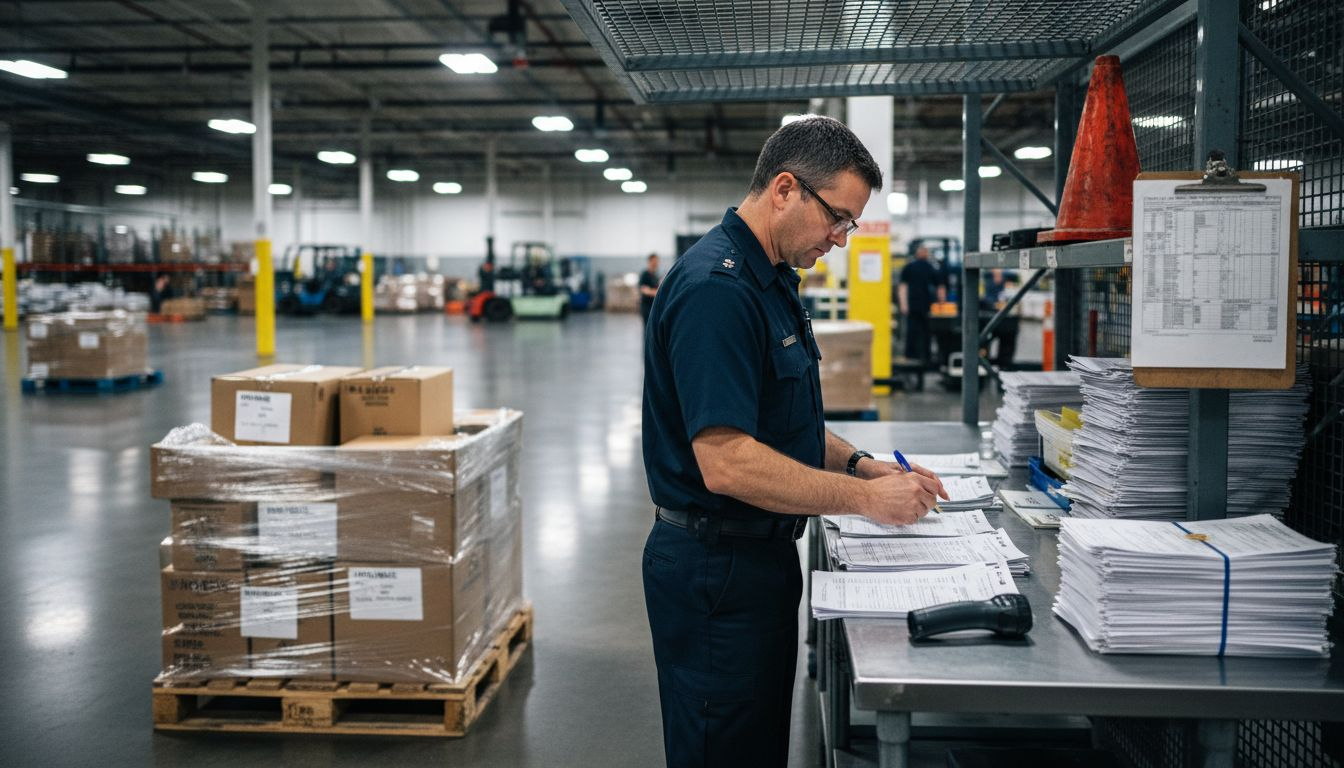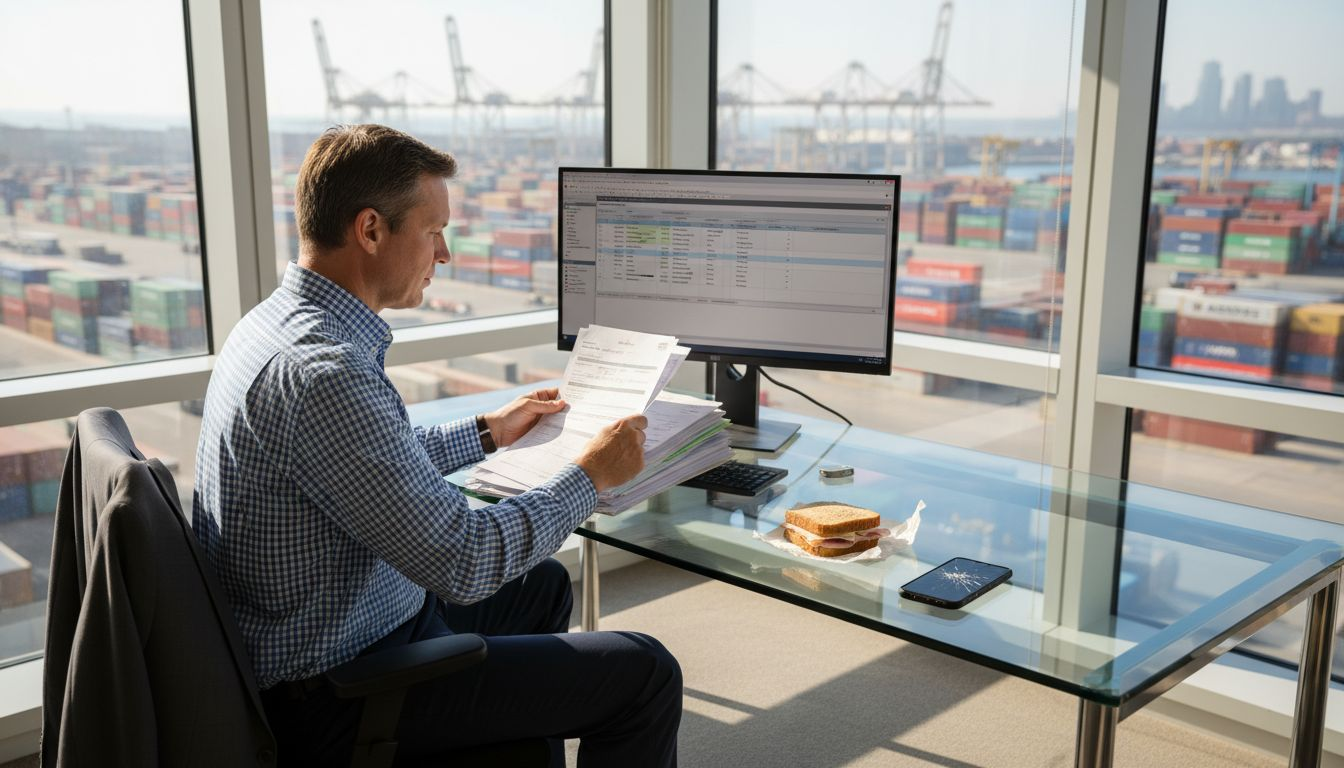Sending packages across borders can feel overwhelming with so many rules, fees, and options to juggle. UPS handles millions of international shipments every day with services reaching over 220 countries and territories. Most people think choosing the fastest shipping option is all that matters. Surprising truth is, the secret to worry-free international shipping starts with understanding paperwork, packaging, and hidden cost details that are easy to miss but make all the difference.
Table of Contents
- Understand UPS International Shipping Options
- Calculate Shipping Costs Accurately
- Prepare Proper Documentation
- Learn About Customs Regulations
- Choose the Right Packaging Materials
- Track Your Shipments Effectively
- Utilize UPS Support and Resources
Quick Summary
| Takeaway | Explanation |
|---|---|
| Choose the right UPS service | Evaluate options like UPS Express Critical and Worldwide Express for speed. Consider budget and urgency when selecting. |
| Accurately calculate shipping costs | Consider base rates, surcharges, and customs duties to estimate total shipping expenses effectively. |
| Prepare precise shipping documentation | Essential documents like commercial invoices and customs forms must be accurate and complete to prevent delays. |
| Understand customs regulations | Stay informed about restricted items and tax calculations to ensure compliance and prevent shipping issues. |
| Utilize UPS resources for support | Take advantage of UPS tools and expert guidance to optimize shipping processes and address challenges proactively. |
1: Understand UPS International Shipping Options
When embarking on international shipping with UPS, understanding the available options is crucial for a smooth and efficient logistics experience. UPS offers several international shipping services designed to meet diverse business and individual needs, each with unique characteristics tailored to specific shipping requirements.
UPS provides multiple international shipping solutions that cater to various priorities and budget constraints. These services include:
-
UPS Express Critical: For time-sensitive shipments requiring immediate transportation
-
UPS Worldwide Express: Offers fast delivery with guaranteed time-definite service
-
UPS Worldwide Expedited: Provides cost-effective international shipping with slightly longer delivery windows
-
UPS Standard: Economical option for less urgent international shipments
Selecting the right shipping option depends on several critical factors. Explore our comprehensive guide on international shipping strategies to help you make informed decisions about your specific shipping needs.
Key considerations when choosing an international shipping service include package weight, destination country, delivery urgency, and budget constraints. Businesses must carefully evaluate these elements to optimize their shipping strategy and minimize potential additional costs or delays.
According to the U.S. Department of Commerce, successful international shipping requires thorough understanding of shipping regulations, customs requirements, and appropriate documentation. Shippers should thoroughly review customs declaration processes, packaging standards, and potential import restrictions before selecting a specific UPS international shipping service.
By comprehensively understanding UPS international shipping options, businesses and individuals can select the most appropriate service that balances speed, cost, and reliability for their unique shipping requirements.
2: Calculate Shipping Costs Accurately
Accurately calculating shipping costs is fundamental to maintaining financial predictability and competitiveness in international shipping. UPS international shipping costs involve multiple complex variables that require careful consideration and strategic planning.
When calculating shipping expenses, businesses must account for several critical components:
-
Base shipping rate: Determined by package weight, dimensions, and destination
-
Surcharges: Including fuel, handling, and potential customs fees
-
Insurance costs: Protecting valuable or fragile shipments
-
Potential customs duties: Taxes and import regulations specific to destination countries
Learn more about reducing international shipping expenses to optimize your logistics budget and improve overall financial efficiency.
Dimensional weight pricing plays a significant role in cost calculations. UPS measures packages based on both actual weight and volume, charging the higher rate. This means businesses must optimize packaging to minimize unnecessary space and reduce shipping expenses.
According to the U.S. Department of Commerce, understanding the total landed cost is crucial. This includes not just shipping fees, but also product cost, insurance, freight charges, tariffs, and potential taxes.
Additional cost considerations include currency exchange rates, potential risk premiums for specific regions, and seasonal shipping rate fluctuations. Businesses should develop a comprehensive cost analysis strategy that accounts for these dynamic factors.
Utilizing UPS online calculators and consulting with shipping specialists can provide precise cost estimates. Regular monitoring and analysis of shipping expenses can help identify potential savings and optimize international shipping strategies.
3: Prepare Proper Documentation
Accurate documentation is the cornerstone of successful international shipping with UPS, serving as a critical pathway to ensuring smooth customs clearance and preventing potential shipping delays. Businesses must meticulously prepare and organize shipping documents to navigate complex international trade regulations.
Key documentation requirements for UPS international shipping include:
-
Commercial Invoice: Detailing merchandise description, value, and origin
-
Customs Declaration Form: Providing comprehensive shipment information
-
Export Packing List: Itemizing package contents and quantities
-
Certificate of Origin: Verifying the country where goods were manufactured
Preparing these documents requires precision and attention to detail. Check our comprehensive guide on international trade documentation to ensure you have all necessary paperwork for seamless shipping.
Accurate product classification is essential for determining appropriate documentation. Each item must be correctly identified using harmonized tariff codes, which help customs officials quickly assess the shipment’s contents and applicable duties.
According to the University of North Carolina, all physical items crossing international borders require thorough documentation review. Incomplete or incorrect paperwork can result in significant shipping delays, potential fines, or shipment rejection.
Additional considerations include ensuring all documents are:
-
Signed and dated appropriately
-
Written in the destination country’s preferred language
-
Completed using clear, legible handwriting or digital formatting
Digital documentation tools can streamline this process, allowing businesses to generate, store, and submit shipping documents more efficiently. UPS offers online platforms that help simplify documentation preparation and reduce human error.
Maintaining meticulous records not only facilitates smoother shipping but also provides valuable documentation for potential future customs inquiries or internal tracking purposes.
4: Learn About Customs Regulations
Understanding customs regulations is crucial for successful international shipping with UPS, as compliance directly impacts shipment clearance, potential fees, and overall logistics efficiency. Navigating the complex landscape of international trade requires comprehensive knowledge of both export and import regulations.
Key aspects of customs regulations businesses must understand include:
-
Restricted and prohibited items: Specific goods that cannot be shipped internationally
-
Tariff classifications: Determining correct product codes for accurate duty assessment
-
Import/export licensing requirements: Special permissions for certain goods
-
Duty and tax calculations: Understanding potential additional costs
Explore our comprehensive guide on navigating customs clearance processes to gain deeper insights into international shipping regulations.
Harmonized System (HS) codes play a critical role in customs documentation. These standardized numerical methods classify traded products enable customs officials to quickly identify and assess incoming shipments, determining appropriate duties and potential restrictions.
According to the U.S. Census Bureau, exporters must meticulously comply with Foreign Trade Regulations, which govern how international shipments are processed and documented.
Important considerations for managing customs regulations effectively include:
-
Staying updated on changing international trade policies
-
Maintaining accurate and comprehensive shipping documentation
-
Understanding country-specific import requirements
Digital compliance tools can help businesses track and manage complex customs requirements. Many shipping platforms now offer real-time updates on regulatory changes, helping companies adapt quickly to evolving international trade landscapes.
Proactive research and continuous education about customs regulations can significantly reduce shipping delays, minimize unexpected expenses, and ensure smoother international logistics operations.
5: Choose the Right Packaging Materials
Selecting appropriate packaging materials is critical for successful UPS international shipping, ensuring your items arrive safely, undamaged, and comply with international shipping regulations. The right packaging protects your shipment from potential damage during complex international transit processes.
Critical packaging considerations include:
-
Durability: Materials must withstand multiple handling stages
-
Weight: Lightweight materials reduce overall shipping costs
-
Protective capabilities: Adequate cushioning for fragile items
-
Customs compliance: Meeting international shipping standards
Learn more about effective packing strategies for international trade to optimize your shipping preparation.
Dimensional weight pricing significantly impacts packaging choices. UPS calculates shipping costs based on both package weight and volume, making compact and efficient packaging crucial for cost management. Businesses should prioritize materials that minimize unnecessary space while providing maximum protection.
According to the U.S. General Services Administration, selecting sustainable and appropriate packaging solutions is essential for safe international shipments. Different items require specialized packaging approaches.
Important packaging material recommendations:
-
Use double-walled corrugated boxes for heavy or fragile items
-
Employ bubble wrap, foam inserts, or air pillows for internal protection
-
Select moisture-resistant materials for international climate variations
Temperature-sensitive and fragile items demand extra packaging considerations. Some international shipments might require specialized insulation or shock-absorbing materials to ensure safe transportation across diverse environmental conditions.
Careful packaging not only protects your items but also demonstrates professionalism and commitment to quality in international business transactions. Investing time in proper packaging can significantly reduce the risk of damage and potential financial losses.
6: Track Your Shipments Effectively
Effective shipment tracking is a critical component of successful UPS international shipping, providing businesses and individuals with real-time visibility and control over their global logistics operations. Modern tracking technologies enable precise monitoring of packages from origin to destination.
Key tracking capabilities to leverage include:
-
Real-time location updates: Precise geographical tracking
-
Estimated delivery times: Accurate arrival predictions
-
Customs clearance status: Understanding potential delays
-
Proof of delivery documentation: Confirming successful shipment completion
Discover advanced global tracking techniques to enhance your international shipping management.
UPS tracking technologies provide multiple communication channels for shipment updates. Customers can receive notifications through mobile apps, email, SMS, and web platforms, ensuring comprehensive and convenient tracking experiences.
According to the U.S. Department of Transportation, advanced tracking systems improve logistics efficiency and transparency across international shipping networks.
Important tracking best practices include:
-
Regularly checking shipment status
-
Maintaining accurate contact information
-
Understanding tracking number formats
-
Preparing for potential customs processing times
Digital tracking tools offer unprecedented insights into shipment movements. These platforms not only provide location updates but also help businesses anticipate potential challenges, manage customer expectations, and make informed logistical decisions.
By implementing comprehensive tracking strategies, businesses can minimize uncertainty, reduce communication gaps, and create more reliable international shipping experiences. Proactive tracking transforms shipping from a passive process to an actively managed strategic operation.
7: Utilize UPS Support and Resources
Leveraging UPS support and resources can dramatically enhance your international shipping experience, providing businesses and individuals with expert guidance, technological solutions, and comprehensive logistics assistance. Understanding and utilizing these resources can transform complex shipping challenges into streamlined operations.
Key UPS support resources include:
-
Online shipping tools: Digital platforms for rate calculation and label generation
-
Customer service centers: Direct access to shipping experts
-
International shipping guides: Comprehensive documentation support
-
Customs compliance assistance: Professional guidance on regulatory requirements
Explore comprehensive international shipping strategies to maximize your shipping efficiency.
UPS digital platforms offer advanced features like automated tracking, real-time notifications, and integrated customs documentation tools. These technological solutions help businesses manage international shipments with unprecedented precision and convenience.
According to the U.S. Department of Commerce, partnering with experienced shipping providers like UPS can significantly simplify complex international logistics processes.
Additional support resource recommendations:
-
Attend UPS webinars and training sessions
-
Utilize free consultation services
-
Subscribe to shipping updates and newsletters
-
Access online knowledge bases and learning resources
Proactive engagement with UPS support channels enables businesses to stay informed about changing international shipping regulations, emerging technologies, and best practices. These resources provide critical insights that can help optimize shipping strategies and reduce potential operational risks.
By fully utilizing UPS support and resources, businesses can transform international shipping from a potentially complex challenge into a strategic, manageable process that drives global business growth and efficiency.
Below is a comprehensive table summarizing the 7 essential tips and key actions for successful UPS international shipping discussed throughout the article.
| Tip/Step | Key Action or Focus | Benefit/Outcome |
|---|---|---|
| Understand UPS International Shipping Options | Assess available UPS services based on speed, cost, and needs | Choose optimal shipping method and avoid delays or excess costs |
| Calculate Shipping Costs Accurately | Factor in rates, surcharges, duties, and use UPS calculators | Achieve better budget control and avoid surprise expenses |
| Prepare Proper Documentation | Accurately complete commercial invoices, customs forms, and lists | Ensure smooth customs clearance and prevent shipment holdups |
| Learn About Customs Regulations | Stay updated on restricted items, tariffs, and compliance rules | Minimize legal risks, prevent rejected shipments, and avoid fines |
| Choose the Right Packaging Materials | Use durable, efficient, and compliant materials for each shipment | Protect goods, lower shipping costs, and comply with regulations |
| Track Your Shipments Effectively | Leverage UPS real-time tracking and notifications | Gain shipment visibility, reduce uncertainty, and improve accountability |
| Utilize UPS Support and Resources | Use digital tools, expert guidance, and educational materials | Streamline shipping, stay updated, and solve challenges efficiently |
Ready to Remove the Stress from UPS International Shipping?
Struggling with the complexities of customs regulations, confusing freight costs, and piles of shipping documents? You are not alone. The challenges highlighted in “7 Essential Tips for Successful UPS International Shipping” – from selecting the right service level to mastering global tracking and achieving cost control – can feel overwhelming for any business aiming to succeed in today’s global economy. But you do not have to navigate these hurdles by yourself. Visit our Uncategorized section to uncover real solutions crafted for exporters and importers just like you.

Worldwide Express, Inc. delivers exactly what your business needs to overcome common shipping pitfalls. Our expert team excels in freight forwarding, customs clearance, documentation support, cargo insurance, and seamless global tracking. Every solution is customized for your cargo, market, and goals. Act now to transform your international shipping headaches into a reliable, cost-effective process. Start by exploring Worldwide Express, Inc. and see how our tailored logistics expertise can simplify your next cross-border shipment. Your global growth deserves a partner who removes risk and uncertainty with every shipment.
Frequently Asked Questions
What are the different UPS international shipping options available?
UPS offers several international shipping services, including UPS Express Critical for time-sensitive shipments, UPS Worldwide Express for fast delivery with guaranteed service, UPS Worldwide Expedited for cost-effective shipping, and UPS Standard for less urgent shipments.
How can I accurately calculate international shipping costs with UPS?
Shipping costs with UPS can be calculated by considering the base shipping rate based on weight and dimensions, surcharges, insurance costs, customs duties, and potential currency exchange rates. Using UPS online calculators can help provide precise estimates.
What documentation do I need for UPS international shipping?
Essential documents for UPS international shipping include a Commercial Invoice, Customs Declaration Form, Export Packing List, and Certificate of Origin. Accurate preparation of these documents is vital for ensuring smooth customs clearance.
How can I ensure compliance with customs regulations in international shipping?
To ensure compliance with customs regulations, businesses should stay updated on restricted items, tariff classifications, import/export licensing, and duty calculations. Accurate documentation and understanding country-specific requirements are also crucial.
Recommended
- 7 Key Tips for Mastering Post Office International Shipping – Worldwide Express, Inc.
- 8 Packing List Essentials for International Trade Success – Worldwide Express, Inc.
- 7 Key Steps for Worldwide Expedited Shipping Success – Worldwide Express, Inc.
- How to Reduce Shipping Costs: Effective Strategies for 2025 – Worldwide Express, Inc.






